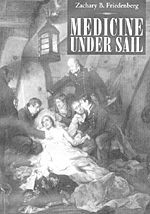Medicine Under Sail
Book Review
reviewed by Paul Chamberlain, UK
| |
In the age of sail, seamen had to survive not only the hazards of battle but often daunting health problems. Ships that left port with banners flying all too often returned with remnants of a crew, haggard and sick. As ships became more seaworthy, navigation instruments more reliable, and lengthy voyages more common, efforts to keep crews healthy became increasingly important. Dr Zachary Friedenberg has produced a comprehensive study of naval medicine during the age of sail; not specifically on the Napoleonic period, but it examines the origins and development of naval medicine up to the early 19th Century. The impact of such developments on the naval war during the period 1793-1815 is included in this work. The author discusses the important roles played by medical men with the foresight and ability to record their observations on a variety of medical conditions including both wounds and disease, throughout the 16th, 17th and 18th Centuries. Many of the early ship's surgeons proposed methods to prevent and control disease, which had a great impact on disease worldwide. Dr Friedenberg has used surviving Surgeon's Journals and reports to examine the health problems at sea and how they were handled. Such accounts make for fascinating reading. Robert Young, surgeon on board the Ardent at the Battle of Camperdown in 1797, vividly describes his work in the cockpit with no mates to assist him, and relates the different types of wound seen during a battle. The author has examined the subject from all angles to produce a balanced study of naval medicine. He looks at the treatment of the sick and wounded, both in the Navy and on board merchant vessels; the theories that abounded on the cause of disease, and the remedies (successful or otherwise) developed for the numerous infections encountered in different climates. The Royal Navy initiated a rudimentary form of disease control in 1794, when Thomas Trotter was appointed as Physician to the Channel Fleet. During the latter part of the 18th Century disease prevention became more prevalent and many naval commanders (including Nelson) realised the importance of health in the effectiveness of their commands. This had a dramatic impact upon the sickness rates within the Royal Navy. In 1793, 38.4% of the seamen were recorded as sick. By 1806, this figure had reduced to 6.4%. The most significant disease in naval history was undoubtedly scurvy, and the book devotes many pages to the study of this condition. Many ship's surgeons described the disease and promoted numerous theories as to the cause, one of which was that putting a scorbutic sailor ashore meant that the land had a curative effect, little realising that it was the access to fresh fruit and vegetable that was the cure. So many seamen were lost to the disease during the 18th Century that there was an economic impetus to find a cure, and many surgeons were now emphasising good diet at sea as the way to prevent and cure this ailment. The story of disease at sea is closely linked with the quality of food and the general conditions on board ship. Dr Friedenberg presents the story of disease and shipboard conditions over the centuries, highlighting particular maladies to show the terrible medical conditions at sea and how they were resolved. Beriberi, typhus (ship fever), tropical fevers, and death and disease in the slave trade are all included in this study. He also briefly examines the effect of impressment and flogging on a seamen's health. Shipwrecks and survivors are also included in this comprehensive examination of the subject, arguing the importance of psychology in saving lives and surviving, and the undoubted importance of a leader in such a crisis. Medicine Under Sail is a fascinating and comprehensive study of naval medicine, looking at all aspects of the health of seamen up to the 19th Century. Any library on naval history should include this work as a valuable addition to the study of health at sea. Book Reviews Naval Special
Nelson's Ships: A History of the Vessels in Which He Served 1771-1805 The Nelson Encyclopaedia With The Utmost Possible Dispatch: Poems of Nelson's Navy Nelson's Battles Sea Life in Nelson's Time Back to Table of Contents -- First Empire # 74 Back to First Empire List of Issues Back to MagWeb Master Magazine List © Copyright 2004 by First Empire. This article appears in MagWeb.com (Magazine Web) on the Internet World Wide Web. Other articles from military history and related magazines are available at http://www.magweb.com |
 Medicine Under Sail
Medicine Under Sail